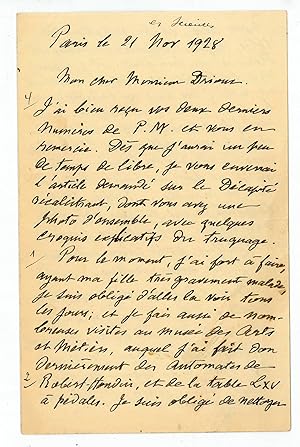Méliès Georges French Illusionist Film (1 results)
Product Type
- All Product Types
- Books
- Magazines & Periodicals
- Comics
- Sheet Music
- Art, Prints & Posters
- Photographs
- Maps
-
Manuscripts &
Paper Collectibles (1)
Condition
- All Conditions
- New
- Used
Binding
- All Bindings
- Hardcover
- Softcover
Collectible Attributes
- First Edition
- Signed
- Dust Jacket
- Seller-Supplied Images
- Not Printed On Demand
Seller Location
Seller Rating
-
Autograph letter signed and monogrammed.
Published by Paris, 21. XI. 1928., 1928
Seller: Antiquariat INLIBRIS Gilhofer Nfg. GmbH, Vienna, A, Austria
Manuscript / Paper Collectible
8vo. 4 pp. on bifolium. Charming and insightful letter to Auguste Drioux in Lyon, publisher of the magic magazine Passez Muscade, thanking him for the most recent issues and promising an article on Robert Houdin's illusion "Le Décapité récalcitrant" from 1890. Méliès mentions that he is currently very busy, as he was taking care of his gravely ill daughter Georgette and restoring some of Robert Houdin's automatons that he had donated to the Musée des Arts et Métiers in Paris: "Je suis obligé de nettoyer tout cela, et de remettre les têtes, mains, costumes, peintures et dorures en bon état. Il y a pas mal de travail, car tout ce matériel est resté 5 ans dans un endroit assez humide, et il en a souffert. Mais une fois retapé il n'y paraîtra plus, et il pourra affronter l'éternité dans les vitrines du Musée. à moins qu'il ne soit, un jour, détruit par un incendie". - The ominous remark that a fire could destroy the museum seems to be an allusion to Méliès' destruction of his own negatives, film sets, and costumes after he lost his legal battle with Pathé over his Montreuil studio in 1923. Méliès praises the performance of Drioux's fellow magicians from Lyon at a banquet by the Chambre syndicale du Cinema that was probably held in his honour. In a postscript he reports that the politician Édouard Herriot, who had also been present at the banquet, apologized to him for not being able to award Méliès with "the famous red ribbon" anymore, having lost his post as Minister of Culture days earlier. However, Herriot promised to put in a good word for Méliès with his successor, also alluding to the possibility that he might get a job in the insurance of the movie industry "Mutuelle du Cinéma," possibly as the director of its retirement home. This prospect gave Méliès hope to be able to finally escape his "dreadful Montparnasse prison": "Il avait promis, pour moi, le fameux ruban rouge, à la demande de Brézillon. Mais c'est bien ma veine, il venait de perdre sa place de ministre 5 jours auparavant. Il a été charmant avec moi, s'est excusé d'avoir été contraint de se 'débarquer' lui-même, ce sont ses propres expressions, mais m'a promis son appui [.] auprès du nouveau Ministre de l'Instruction publique et des beaux arts. [.] En tous cas, j'ai su qu'il est question de me donner une situation intéressante dans l'état major de la Mutuelle du Cinéma; peut-êtrela direction de la maison de retraite. Inutel de dire que cela ferait fort bien mon affaire, en me libérant de mon affreuse prison de Montparnasse". - Following his bankruptcy in 1925, Méliès and his second wife Jehanne d'Alcy barely made a living with a small candy and toy stand in Gare Montparnasse. Around this time Méliès, who had been slipping into oblivion since 1913, was slowly rediscovered and recognized as a film pioneer by journalists and enthusiasts such as Auguste Drioux. Despite the renewed interest and official recognition like the award of the Legion of Honour, Méliès' financial situation improved little. While the post as director never materialised, Méliès, his wife, and his granddaughter received a place in the retirement home in Orly in 1932.


